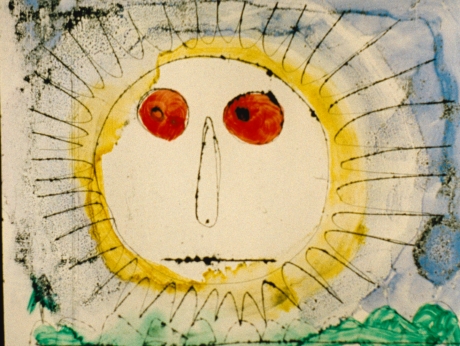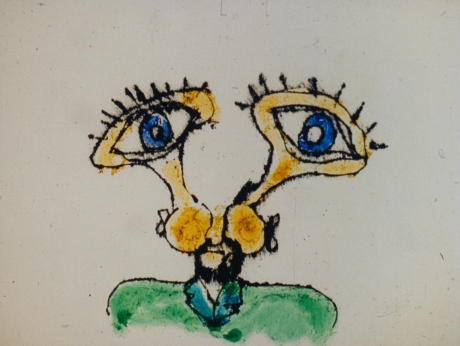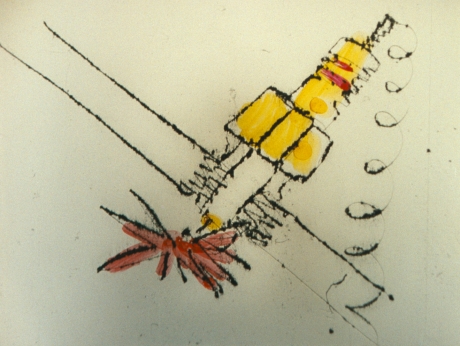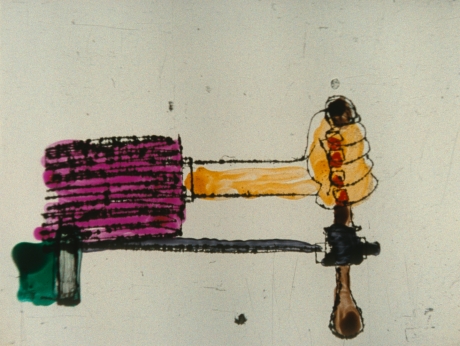
 overview
overview

 storyline
storyline
The world is gradually falling apart. Tanks, missiles, bombings, submarines. Thunder claps, strikes of lightning, fallen trees. Car crashes, dangerous accidents, disasters. Contorted faces; a person being crushed by office stamps and being even more harmed by paragraphs; his eyes bulging. A knife stuck in an eye, a skull dissected in half; a man sawing off a branch on which he’s sitting. A woman standing by a streetlight, a blow in the jaw, streams of vodka flowing, finally - a grave. All of the above to the beat of an afflicting, wistful beggar's ballad whose main protagonist is utterly overwhelmed by confusion. Then there’s the end title that reads: E = mc². This is the paranoid world which emerges from the pulsating reflection of Julian Józef Antonisz’s non camera.

 comment
comment



















The lyrics of the ballad which accompanies the dreadful collage, performed by the main protagonist of ‘Old Man’s Blues Non Camera, or Feet First’ (dubbed by Aniela Jaskólska, the Cracow Animated Film Studio’s cleaning lady) follow: ‘I asked a professor, tell me what's the point? / The reply he gave me, 'There's nothing wrong.' / I asked the CEO, then, if he could reply, / He gave me a once-over, left and said, Bye, bye...’.
The movie, painted and drawn directly onto a movie tape, as the respective board informs, conveys the Cracow's artist thorough examination of life under socialism and everything it consists of – its components being paradoxical enough to border on the surreal. The only thing left to do is drink alcohol: ‘I keep quaffing vodka and don't capish a thing. / Everything wobbles around and I slump to the ground. / And down on the ground I die of fatigue. / I still don't grasp it all but I am no more’ – follow the words of the narrating protagonist of ‘Old Man’s Blues…’. As has been emphasized by the artist repeatedly, the world's gone paranoid and has thus become incomprehensible. ‘The pulsating realm of non camera is my only cure for this parallel, paranoid world’ - he said during our last interview.
Antonisz was not only the movie's director, screenwriter and artist, but also the author of the words and music of the titular blues. It is undoubtedly one of his most individual and also most important works. Here we encounter all of the distinctive features of his art: the art of absurdist, reverie-tinged humor infused with surprising ideas and delivered in an expressively rhythmical aesthetic. These same qualities have awarded Antonisz a Silver Pegasus Award during the 11th Films on Art Festival held in Zakopane, where the jury recognized ‘Old Man’s Blues…’ in particular for its special artistic value.
A prominent expert on Polish shorts, the now deceased Bogumił Drozdowski (Arcitenens), had described ‘Old Man’s Blues…’ after it's premiere in an article later published in the ‘Film’ magazine (No. 33/1978) as ‘a piece drawn freely upon one single cinema-obsessed man's multiple imaginations: artistic, musical, literary, technical and the imagination that allows general use, having thereby confirmed that the ’non camera’ manifesto was neither a bluff, nor a publicity stunt, nor a threnody to a beautiful artistic death, but a beginning of a new path, a path which needn't be, shouldn't be a way made public’. And so it was that this path would later become a beautiful artistic high road, an original and important one, albeit non-public. Jerzy Armata